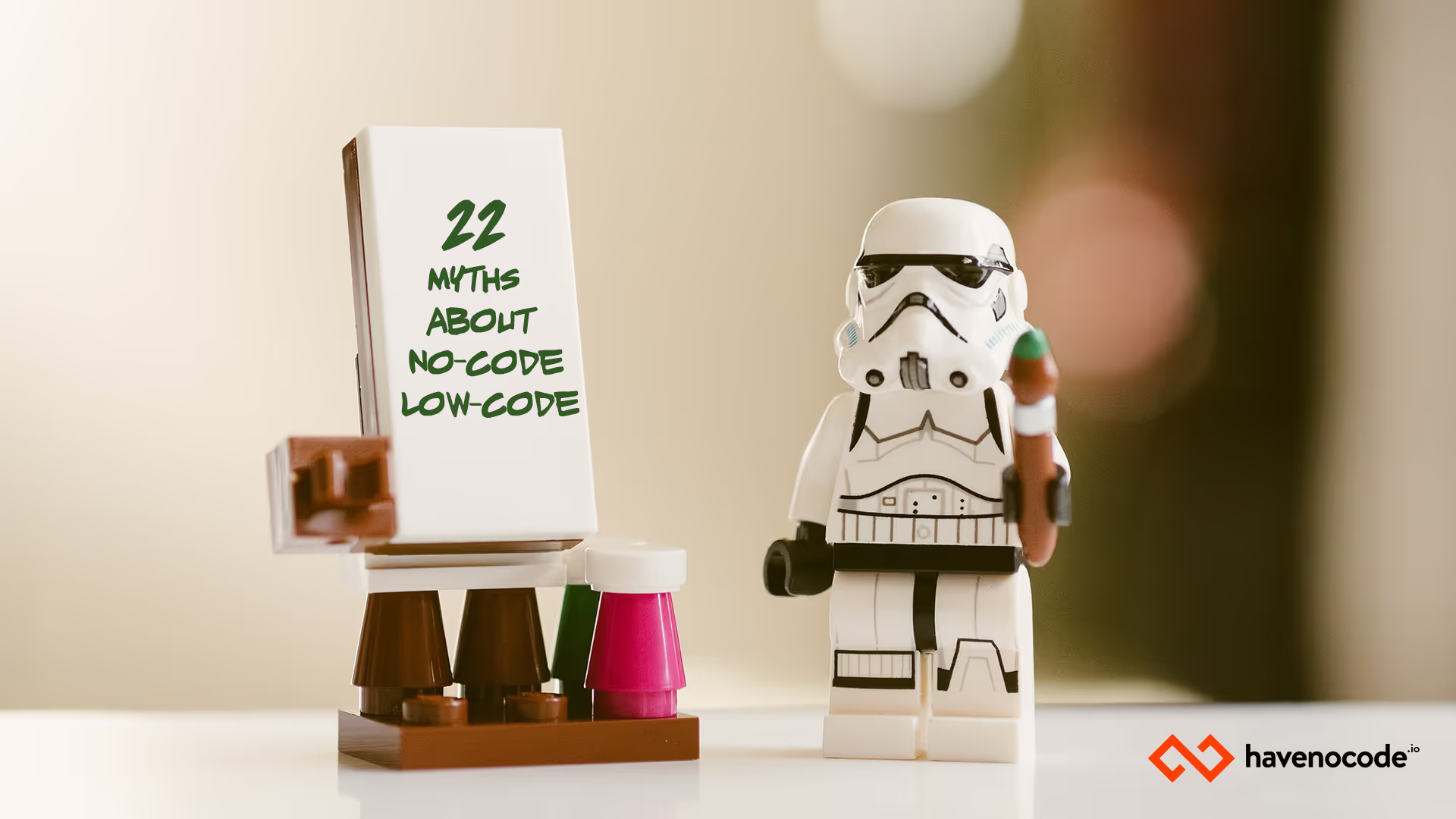Today, we will take a look and discuss the most popular myths about no-code. There is a big lack of knowledge about this new approach in app development. However, this trend is no longer a fancy word and buzz. Now we are dealing with a big movement which will result in huge changes in the following years. It would be a shame not to get on the train of this movement and not get ahead of your competition.
There are a lot of myths about no-code / low-code and that’s why we decided to split this article into two parts (part 2 you can find here). Let’s start!
1. Low-Code / No-Code Platforms only work for small departmental applications
Myth – Low-code and no-code apps are currently being used for complex enterprise applications in organizations across the globe. Low-code platforms can be used to build even more complex applications. However, these platforms require technical skills to do so.
Many organizations feel no-code / low-code as something basic. That’s why they do not use it to make another step towards digitalization. The fact is that there are a lot of global companies which are running only on no-code / low-code platforms and solutions. It may start with just the onboarding process of a new employee but it usually expands to take over the entire department and then scale to the others.
2. Low-Code / No-Code Platforms address only the “Build” phase of the application development
Low-code / no-code platforms support the entire application development life-cycle, right from ideation to deployment and maintenance. A lot of people worry about the need to migrate to custom development, before they even build an MVP solution. In most cases, there is no such need as low-code / no-code platforms are suitable to run your business successfully.
3. Low-Code / No-Code platforms are not flexible
Low-code / no-code platforms were actually built for flexibility and ease of use! Users can convert their ideas to applications in minutes and hours. According to their needs, they can modify or extend the functionality anytime they want.
A lot of platforms are also open to add custom code with custom functionality and elements.
This is one of those funny myths about low-code / no-code platforms. The whole purpose of these platforms is to provide flexibility for businesses to solve their unique challenges and build custom applications to suit their needs.
4. Use of Low-Code / No-Code platforms lead to the creation of “Shadow IT”
Shadow IT refers to mismanaged and ungoverned development and use of apps. The fear is that since low-code no-code development is so easy, anyone can start building and using the apps creating application silos in the organization resulting in disconnected systems and chaos.
First of all, not everyone wants to start building, also not everyone will have access to appropriate assets, and not everyone will be able to build something on no-code platforms. Also, with proper governance from the central IT team, the IT backlog can be cleared quickly without the risk of Shadow IT.
5. Investors don’t take no-code / low-code seriously.
A lot of global platforms are built with no-code:
- Dividend Finance - raised 1 bln $ from investments and loans
- Bubble.io - no-code platform raised 100 mln $ in 2021
- Microsoft - build PowerPlatform to enable low-code / no-code development on Microsoft 365 platform
- Google - build AppSheet to enable users quick app development
- AppGyver - another no-code platform that was acquired by SAP in February 2021
Also, no-code tools allow businesses to maximum cut time-to-market when they want to try new ideas. You still think that no-codes are something that investors won't be interested in?
6.With Low-Code / No-Code Platforms, custom development is not possible
Advanced low-code and no-code platforms offer a lot of customization without the involvement of complicated tools or extensive coding. Most of these platforms are built based on the most popular programming languages.
Since the motive of low-code and no-code development is to achieve a lot without code (or with as little code as possible), lack of customization is among the most common myths about low-code no-code platforms today. No-code agencies like us, are free to expand the functionality of a low-code platform as the needs arise.
7. Low-Code / No-Code platforms can be used by anyone to build apps
It’s definitely not true. Of course, no-code / low-code tools are simpler than traditional coding on the first look. But deeper we dive, things get more complicated. Simple app, with several simple workflows probably could be easily built by citizen developers. Still, no-code / low-code is a set of skills and knowledge, which needs to be learned and of course it takes time (like everything else). To build complex solutions we need to have complex knowledge and skill, to have complex knowledge and skill we need to sacrifice time to learn it. That’s why there are more companies like us, to help you build your MVP.
8. Low-code / no-code can't be used for legacy transformation.
Even more, they should be used to transform from legacy transformation. Why? Because you can quite easily, in a short time and at a low cost transfer your company to the XXI century.
Also, you could connect new front-end systems to your old resources, and migrate them in between.
9. In no-code we cannot use AI or ML
Probably. You won't build a new AI or ML algorithm. If you want, no-code is not for you. If you want to use existing AI or ML, for example services like Google Vision or others, a no-code platform, especially Bubble, will be great!
All 3rd party services which have an open API can be easily integrated with no-code platforms to leverage their functionality.
10. Low-Code / No-Code platforms make coding obsolete
Not true at all. Nowadays, the software development market is overheated. There is a big lack of programmers, even 800k in the EU. No-code / low-code platforms democratize access for more people to create new software that may change the future.
That does not mean that coding will become obsolete. It means that most ideas will be tested in a shorter time. After an idea is tested, and maybe no-code is not enough, then traditional programming will stand out.
Also, there are still several areas which cannot be covered by no-code. For example: creation of AI, ML algorithms, advanced banking systems, etc.
11. Low-Code / No-Code platforms are suitable only for lightweight apps
Advanced low-code and no-code platforms can be used to build simple to very complex business applications. Some examples:
- Cybero - 2.1 mln users
- AutoScout24 - Largest vehicle marketplace in Switzerland
- Qoins - helped their customers pay off over $12 million of debt
- Think Confluent - now have more than 335k of users
- DHL mobile platform to report vehicle damages
- You can also check our case studies, more examples you can also find on blogs of no-code platforms owners like AppGyver and Bubble
These are only a few examples of successful businesses built on no-code platforms. However, traditional no-code platforms do have limitations in terms of complexity of the applications that can be built using the platform.
If you want to check if your solution could be easily build with those platforms, don't hesitate to contact us on below link!
.avif)






-min.avif)

%2520(1).avif)












